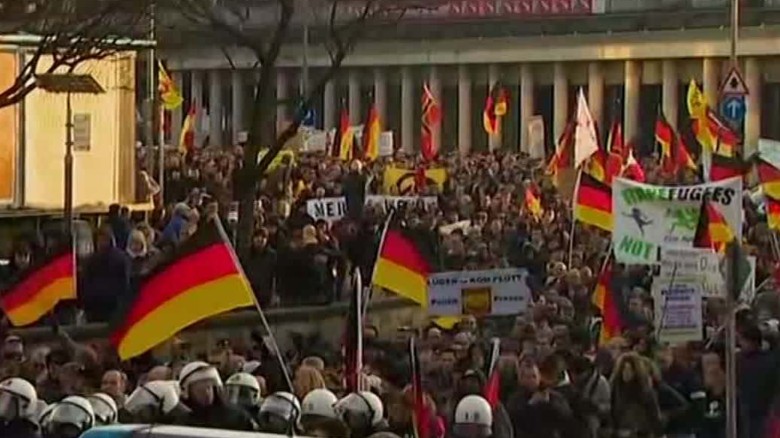Germany has announced plans to relax its restrictions on deporting foreign criminals after an unprecedented wave of mob sex assaults in Cologne and other cities on New Year's Eve.
Germany's Justice Ministry announced Tuesday that new laws had been drafted to allow it to more easily deport migrants found guilty of crimes causing death or serious injury, sexual or physical assaults, or resisting police officers.
Previously, migrants to Germany could be deported only if they were found guilty of crimes punishable by a sentence of one year or more.
In a statement, the ministry said the new rules would allow authorities to deport criminals more swiftly. The new laws could be passed as early as next month, a ministry spokesman said.
Cologne police said Monday that there had been 553 criminal complaints stemming from that night, about 40% of which relate to sexual assaults.
At least 31 people, most from North African or Middle Eastern countries, have been charged so far over the attacks, police say. Of those, 18 have been identified as asylum seekers.
'Rapefugees not welcome'
The assaults have fueled the already heated debate over immigration in Germany, which has taken in the bulk of migrants creating a crisis on Europe's borders, and have sparked furious protests around the country.
In a rally organized by a chapter of an anti-Muslim organization, PEGIDA, protesters marched through the streets of Leipzig in eastern Germany, on Monday night, blaming the sexual assaults on migrants.
Some chanted "Deport them!" while others waved signs demanding that refugees be sent home.
A sign read "Islamists not welcome," while another poster depicted German Chancellor Angela Merkel being groped.
Leipzig police spokeswoman Maria Braunsdorf told CNN that police had surrounded at least 250 right-wing extremists after some local businesses were ransacked. Many wore masks to shield their identity, which is against the law in Germany, she said.
Nearby, counter-demonstrators came out in force to show their support for the refugees. One banner read, "Willkommen in Leipzig" ("Welcome to Leipzig").
Report: Germany turning back greater numbers
The protests took place as police in neighboring Austria revealed that Germany has been sending an increasing number of migrants back to Austria after the attacks, most of them from North African countries.
David Furtner, a spokesman for the Upper Austria Federal Police, said that since December, Austria and Germany had had a "memorandum of understanding" that they would turn back a maximum of 60 migrants per day.
Protesters in Leipzig hold aloft posters depicting German Chancellor Angela Merkel being groped and of Hungarian PM Viktor Orban, known for his anti-migrant stance. The latter reads "Thanks" in Hungarian.
But since the start of the year, the number of migrants turned back had increased to up to 200 a day.
He said that only a small number of Syrians were among those turned back, with the majority hailing from Algeria or Morocco, and some from Afghanistan.
Furtner said he did not have details on where the migrants went next, saying some may try to re-enter Germany, while others probably sought asylum in Austria.
Foreigners attacked
After police identified some of the suspects as migrants, several foreigners in Cologne came under attack.
A gang of 20 men attacked at least six Pakistani nationals Sunday, Cologne police said. Two of the victims had to be hospitalized.
Afterward, five men attacked and injured a man of Syrian descent, police said.
Authorities detained two people after the assaults on the men.
A national debate
The reported assaults have sparked fierce public debate about Merkel's liberal policies toward migrants and have unleashed a wave of anger over authorities' response to the attacks.
In an interview published Sunday in Germany's Bild am Sonntag newspaper, Justice Minister Heiko Maas expressed his view that the attacks were not opportunistic, but a premeditated and organized assault on women.
"No one can tell me that it wasn't coordinated and prepared," he told the newspaper.
Cologne police Chief Wolfgang Albers was fired Friday amid criticism of his department's handling of the violence.
And Cologne Mayor Henriette Reker has been slammed for advising women to keep "more than an arm's length" away from unknown men in response to the assaults.
Reker later said her comments had been taken out of context.
(CNN)
www.ann.az
Follow us !











